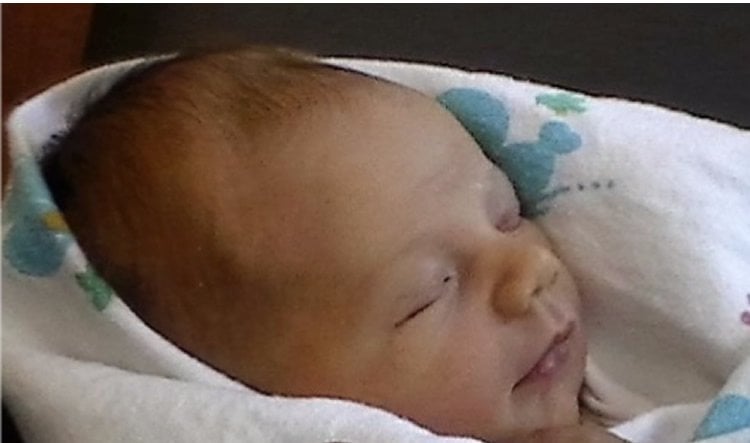Summary: Contrary to popular belief, researchers report infants who co-sleep in their parent’s bedroom do not experience an increased risk of developing behavioral problems later in childhood. The study reports there are beneficial outcomes of co-sleeping, such as improved child sleep quality and increased prosocial behavior.
Source: Radboud University.
Sleeping in the parental bedroom as a baby is not related to sleeping problems or behavioural problems later in life. Moreover, there are indications that room-sharing may even be related to positive outcomes, such as improved sleep quality and more prosocial behaviour. These conclusions are the result of a large longitudinal study focusing on infant sleeping arrangements during the first six months of life. An article by developmental psychologist Roseriet Beijers of Radboud University, in collaboration with researchers from the University of Maryland, has been published in Child Development on September 20th.
In the Netherlands, and in many other Western countries, parents are advised to let their baby sleep in the parental bedroom (room-sharing) for the first six months of life, as this sleeping arrangement reduces the risk of SIDS (sudden infant death syndrome) by almost 50 percent.
Parental bedroom or own room?
Nevertheless, for various reasons many parents choose to let the baby sleep solitary in his or her own bedroom. Some parents opt for solitary sleeping because they feel that room-sharing fosters baby’s dependency on their parents. The baby might, for example, need the parents to go or return to sleep. Such dependency is thought to lead to developmental problems later in life, such as sleep and behavioural problems.
‘However, there are also parents and professionals who believe that room-sharing has facilitating effects on children’s later development’, says developmental psychologist Roseriet Beijers. ‘Despite the many speculations on the possible negative or positive long-term consequences of parent-infant room-sharing, as yet there was no study in which infants’ sleeping arrangements early in life were related to their behaviour later in life’.
First longitudinal study
To obtain a better understanding, Beijers and her colleagues conducted the first large longitudinal study on infant sleeping arrangements, involving almost two hundred babies and their parents. Parents kept a daily sleeping diary of the first six months of their baby’s life, which enabled the researchers to determine how many weeks the babies slept in their parents’ bedroom. Subsequently, the children were followed until they were six to eight years of age. Mothers and teachers were asked to report on the behaviour of the children, and the children were observed in behavioural tasks. This way, the researchers were able to investigate children’s sleep problems (i.e. bedtime struggles, increased night wakings), behavioural problems (i.e. anxiety, aggression), and prosocial behaviour (i.e. helping others).

The results showed that room-sharing is not related to sleep or behavioural problems in middle childhood. Beijers: ‘Although there are speculations that room-sharing early in life leads to sleep and behavioural problems, our study does not reveal any negative effects of room-sharing in the first six months of life on child development’.
It actually appears that room-sharing early in life is related to positive outcomes, such as improved child sleep quality and more prosocial behaviour. Beijers: ‘However, before we can draw more definitive conclusions about positive and negative effects of room-sharing on child development, this important issue must be investigated in greater depth’.
The above research is part of the ongoing BIBO study. BIBO is short for Basale Invloeden op de Baby Ontwikkeling (basal influences on baby development). The overall aim of the BIBO study is to examine prenatal and early caregiving factors and their impact on children’s development and health. The BIBO project has been following more than 190 mothers and their children from the last trimester of pregnancy onwards. BIBO has grown to become a large-scale longitudinal study in which much important data has been collected.
Source: Roseriet Beijers – Radboud University
Publisher: Organized by NeuroscienceNews.com.
Image Source: NeuroscienceNews.com image is credited to Neuroscience News.
Original Research: Open access research for “Parent–Infant Room Sharing During the First Months of Life: Longitudinal Links With Behavior During Middle Childhood” by Roseriet Beijers, Jude Cassidy, Hellen Lustermans, and Carolina de Weerth in Child Development. Published September 20 2018.
doi:10.1111/cdev.13146
[cbtabs][cbtab title=”MLA”]Radboud University”Baby Sleeping in Parent’s Bedroom Not Related to Later Life Behavioral Problems.” NeuroscienceNews. NeuroscienceNews, 25 September 2018.
<https://neurosciencenews.com/baby-sleeping-behavior-9912/>.[/cbtab][cbtab title=”APA”]Radboud University(2018, September 25). Baby Sleeping in Parent’s Bedroom Not Related to Later Life Behavioral Problems. NeuroscienceNews. Retrieved September 25, 2018 from https://neurosciencenews.com/baby-sleeping-behavior-9912/[/cbtab][cbtab title=”Chicago”]Radboud University”Baby Sleeping in Parent’s Bedroom Not Related to Later Life Behavioral Problems.” https://neurosciencenews.com/baby-sleeping-behavior-9912/ (accessed September 25, 2018).[/cbtab][/cbtabs]
Abstract
Parent–Infant Room Sharing During the First Months of Life: Longitudinal Links With Behavior During Middle Childhood
Current recommendations encourage parent–infant room sharing for the first 6 months of life. This longitudinal study (N = 193) is the first to examine long‐term relations of early room sharing with three domains of child behavior: sleep, behavior problems, and prosocial behavior. Information on room sharing was collected daily for infants’ first 6 months. At ages 6, 7, and 8 years, outcomes were assessed with maternal and teacher questionnaires and behavioral observations. Early room sharing was not related to sleep problems or behavior problems. Additionally, more weeks of room sharing were positively related to higher maternal ratings of child sleep quality and more prosocial behavior. In conclusion, early room sharing appears to be related to positive, but not negative, behavior outcomes in middle childhood.






